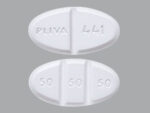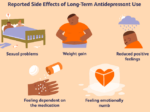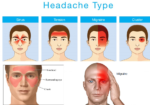Whether it’s due to stress, lack of sleep, or the result of a few glasses of wine, there are many reasons you may experience a headache. What’s more, some of the medications that you rely on to keep you healthy can be unsuspecting culprits, too.
Erectile dysfunction (ED) pills, nitrates, and blood pressure medications are common triggers of this unwelcome side effect. And sometimes the medications you take to ease headache pain can actually cause it — especially if taken for headaches too frequently.
If you’re experiencing headaches, it pays to check your current medication list. While it’s not a complete list, below we cover 11 medications that may cause headaches and explore what you can do to find relief.
1. Blood pressure medications
Some people get headaches from blood pressure pills, especially after they first start taking them. Headaches may also happen if your blood pressure drops too low or you’re dehydrated from fluid loss.
Examples of blood pressure medications that may cause headaches include:
- Angiotensin-converting enzyme (ACE) inhibitors such as lisinopril (Zestril)
- Angiotensin II receptor blockers (ARBs) such as losartan (Cozaar)
- Diuretics (water pills) such as hydrochlorothiazide (Microzide)
Medications used to treat ED, such as Viagra (sildenafil), can cause headaches as a side effect. Other examples include Cialis (tadalafil), Stendra (avanafil), and vardenafil. These medications are also known as phosphodiesterase-5 inhibitors, and headaches are one of the most common side effects of taking them.
Experts don’t fully understand why these medications can cause headaches. But one theory suggests that medication-related changes to a chemical called nitric oxide may play a role. The good news is that these headaches usually resolve on their own once the medication is out of your system.
If you’re experiencing headaches from taking an ED medication, let your prescriber know. They may suggest an over-the-counter (OTC) pain reliever such as acetaminophen (Tylenol) for occasional headaches. Frequent headaches or those that distract from your daily functioning may warrant a lower medication dose. If that doesn’t help, your prescriber may have you try a different ED treatment.
3. Nitrates
Another group of medications known for causing headaches is nitrates, which are used to treat or prevent chest pain. Examples include nitroglycerin (Nitrostat), isosorbide mononitrate (Monoket), and isosorbide dinitrate (Isordil).
Experts think that nitric oxide also plays a role in headaches triggered by nitrates. But other chemicals may also contribute to headaches.
Headaches from nitrate medications might happen within 1 hour of taking them. But they can also happen 3 to 6 hours later, usually with more severe or “migraine-like” symptoms.
Mild headaches caused by nitrates may improve on their own as your body gets used to the medication. If they distract from your daily functioning, your healthcare team may suggest temporarily taking a pain reliever such as acetaminophen.
However, some people experience severe headaches that can make nitrates difficult to tolerate. In this case, check with your healthcare team for the best way to resolve your symptoms.
4. Decongestants
Decongestants such as pseudoephedrine (Sudafed) help treat a stuffy nose. They’re also sometimes taken to relieve headaches — particularly those caused by a sinus infection. But they can cause headaches as a side effect.
Headaches from decongestants typically go away after the medications’ effects start to wear off. If your headache persists after you’ve stopped taking them, it may have a different cause. This can include rebound (or medication overuse) headaches, which is covered later.
Let your healthcare team know if your headaches don’t go away or if they get worse. If they’re accompanied by symptoms such as difficulty breathing or chest pain, seek immediate medical attention. This could be a sign that you’ve taken too much of these medications.
5. Statins
Statins are commonly used to treat high cholesterol. Examples include rosuvastatin (Crestor), atorvastatin (Lipitor), and simvastatin (Zocor). Up to 1 out of every 6 people taking statins reports experiencing headaches — most often when they first start taking one.
It’s unclear why statins may cause headaches. But the symptoms are usually mild and resolve on their own. Until then, your healthcare team may suggest an OTC pain reliever if the headaches distract from your daily functioning.
A sudden, severe headache with vomiting and neck stiffness is an indicator of something more serious. Go to the nearest emergency room right away if these symptoms develop.
6. Proton pump inhibitors such as omeprazole
Headaches are commonly reported by people taking proton pump inhibitors (PPIs). These medications are used to lower the amount of acid in your stomach. Examples of PPIs include pantoprazole (Protonix), omeprazole (Prilosec), and esomeprazole (Nexium).
Experts don’t fully understand why PPIs can cause headaches. But they may be more common in women and with the use of esomeprazole or lansoprazole (Prevacid).
In general, it’s best to take PPIs for the shortest amount of time advisable, or as otherwise directed. If you’re experiencing mild headaches while taking one, they should resolve after you finish treatment.
But sometimes headaches from PPIs can make the medication difficult to tolerate. Let your healthcare team know if this is the case. They can provide you with next steps.
7. Antidepressants such as Wellbutrin
Wellbutrin (bupropion) is an antidepressant that treats mental health conditions such as depression. And sustained-release bupropion is used to help with smoking cessation. Headaches are one of the most commonly reported side effects of Wellbutrin. This includes immediate-, sustained-, and extended-release forms.
Headaches from Wellbutrin are likely to get better over time as you get used to the medication. But if your headaches don’t get better or become severe, let your healthcare team know.
Wellbutrin isn’t the only antidepressant that may cause headaches. Headaches are also possible with other antidepressants, including selective serotonin reuptake inhibitors (SSRIs) such as fluoxetine (Prozac) and escitalopram (Lexapro).
8. Hormonal medications such as oral contraceptives or hormone replacement therapy
Hormonal birth control, including oral contraceptives, is taken to prevent unplanned pregnancies. It can also help manage other conditions such as acne or polycystic ovary syndrome (PCOS). The hormones in these medications can contribute to several side effects, including headaches.
Headaches tend to happen within the first month of taking hormonal birth control. They should resolve after about 2 to 3 months of taking the medication.
You can usually manage mild headaches related to hormonal medications at home with OTC pain relievers and at-home remedies. But if your headaches persist or get worse, let your prescriber know. If your birth control pills are the cause, they may recommend a non-hormonal alternative.
Just as hormonal oral contraceptives can cause headaches, hormone replacement therapy (HRT) can also contribute to headaches. This is thought to be due to fluctuating hormone levels. Contact your prescriber if you develop headaches while taking HRT.
Keep in mind: While the overall risk is low, hormonal treatments like oral contraceptives and HRT can increase the likelihood of blood clots. This includes clots that cause a stroke. Headache, along with other symptoms such as difficulty speaking and one-sided body weakness, can be indicators of a stroke. Call emergency responders or go to your nearest emergency room if these symptoms develop.
9. Overuse of NSAIDs and other headache medications
Many medications that treat headaches can also cause them, especially if you take them frequently for headache pain. This is known as rebound or medication-overuse headaches.
There are many headache medications that can cause rebound headaches. Common culprits are:
- Nonsteroidal anti-inflammatory drugs (NSAIDs) such as ibuprofen (Advil, Motrin) or naproxen (Aleve, Naprosyn)
- Tylenol
- Caffeine (from OTC pills or caffeinated beverages)
- Opioids such as tramadol (ConZip, Qdolo) and oxycodone (Roxycodone, Oxycontin)
- Barbiturates such as butalbital, which is an ingredient in the headache medication Fioricet (butalbital / acetaminophen / caffeine)
- Triptan medications
Rebound headaches tend to happen after the pain relief from the medication wears off. They might happen daily or every other day and may be worse in the mornings. If you’re noticing this pattern of headaches returning and sticking around, talk to your healthcare team.
Often, the best way to treat a rebound headache is to stop the medication that’s causing it. Your prescriber can help you safely stop taking it while still managing your headaches.
You might be surprised to see triptans on the list of medications that can cause headaches, since they’re a common migraine treatment. But if you take triptans too often, there is a risk of having overuse headaches. This is more likely if you take triptans for 10 or more days per month. So it’s best to take triptans only a few days during the week, if possible.
10. Antibiotics
Many types of antibiotics are known to cause headaches as a possible side effect. This includes antibiotics such as cephalexin (Keflex), amoxicillin (Amoxil), and nitrofurantoin (Macrobid, Macrodantin, Furadantin). But keep in mind that many infections can cause headaches, too. So the headaches may not always be related to the antibiotics you’re taking.
If you have headaches while you’re taking antibiotics, don’t stop taking your medication. Talk to your prescriber first. They can help you find relief from your symptoms or discuss next steps.
11. Stimulants
Stimulants are commonly used to treat attention-deficit hyperactivity disorder (ADHD) as well as to promote weight loss. Headaches are considered a common stimulant side effect. But, migraines also appear to be more common in people with ADHD in general.
Examples of stimulants that can cause a headache include methylphenidate (Ritalin, Concerta), mixed amphetamine salts (Adderall), and lisdexamfetamine (Vyvanse). The weight-loss medication phentermine (Adipex-P) is another potential culprit.
If you have headaches while taking stimulants, let your healthcare team know. They can help you determine next steps to safely relieve your symptoms.
Other FAQs about medications and headaches
Below, we answer a few frequently asked questions about headaches and their relationship to certain medications and supplements.
What about prednisone and migraines?
Corticosteroids, such as prednisone, aren’t commonly known to cause headaches like migraines as a side effect. In fact, there might be some cases where corticosteroids can help treat migraines and other headaches, even though they aren’t first-choice treatments.
However, some prednisone side effects, such as increased blood glucose (sugar), high blood pressure, and sleeping problems, may contribute to headaches in some people. Your prescriber can help you figure out if your headaches are from prednisone or a different cause.
Can vitamins give you a headache?
It’s possible. Many people take vitamins, and headaches are a common complaint, so some association might be coincidental.
But one study found that people taking vitamins and supplements had a slightly higher chance of headache or migraine complaints. Getting too much vitamin A, for example, can cause headaches. On the other hand, taking vitamin B and vitamin D supplements might actually help with headaches.
Can blood thinners cause headaches?
Possibly. Headaches aren’t necessarily a common side effect of blood thinners. But some data suggest that blood thinners could increase how often and how severe migraines are for people who have them.
As mentioned above, a headache is a symptom of stroke, which blood thinners can help prevent. But severe headaches can also be a symptom of bleeding in the brain, which is a possible side effect of blood thinners. If you have stroke symptoms, get emergency help right away.
When should you contact your healthcare team about headaches from medications?
Contact your healthcare team about headaches from medications if you’re concerned about your symptoms. Mild headaches can usually be managed at home and may resolve on their own.
But if your headaches are causing you significant pain or discomfort, or distracting from your daily functioning, it’s best to seek medical care. Your prescriber may adjust your medications to see if it will help. But don’t stop or change any of your medications without your care team’s approval.
If your headache happens alongside other symptoms, including chest pain, difficulty speaking or breathing, or fainting, call emergency responders or go to the nearest emergency room.
Pain Medications, Pain Relief, and Pain Management










